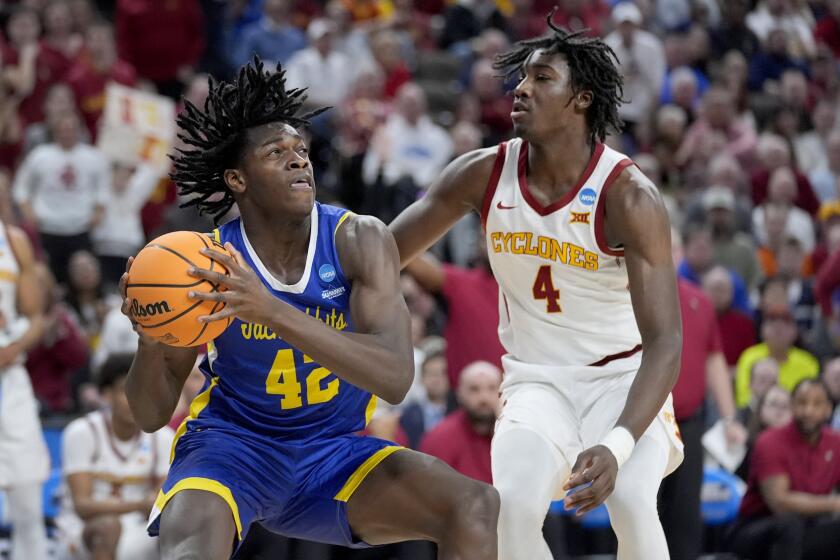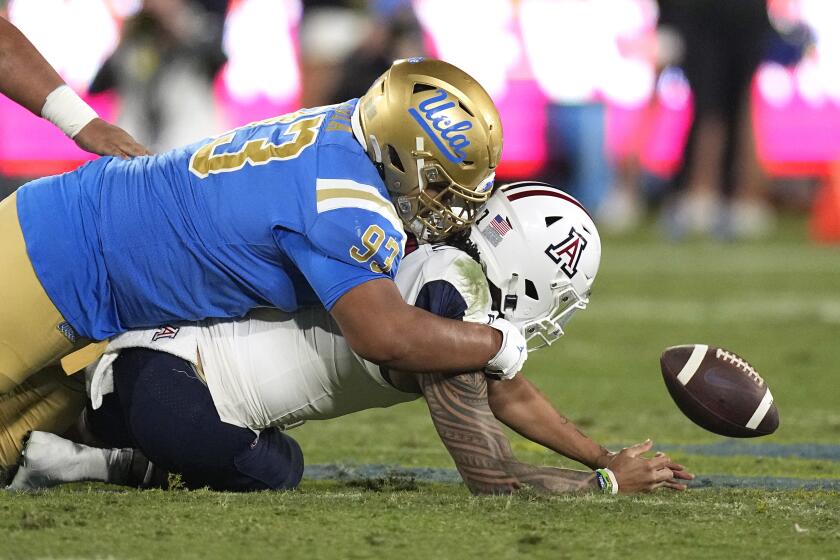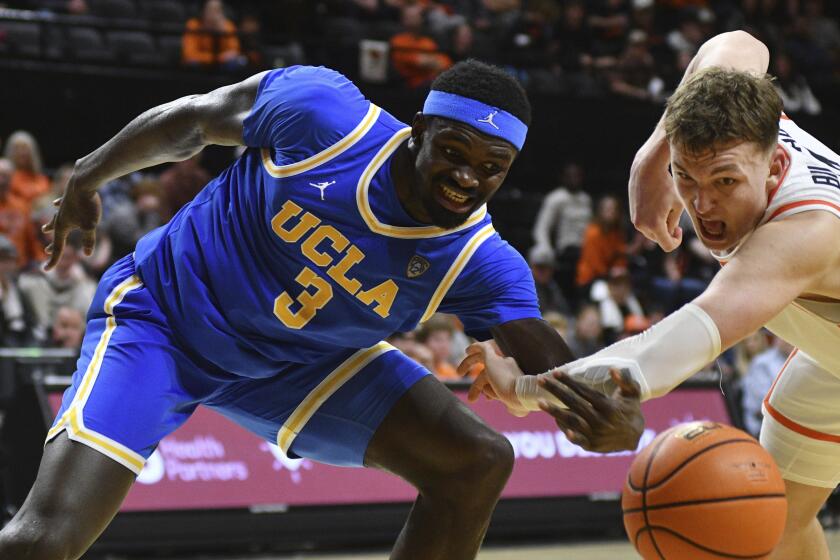Slowly but surely
The challenge facing UCLA this weekend is fairly straightforward.
The Bruins must find a way to contain Oregon State tailback Jacquizz Rodgers, one of the leading rushers in the nation.
But their strategy for corralling the fidgety-quick freshman seems twisted around. As tackle Brian Price explains: “We have to play slower.”
The Beavers figure to lean heavily on their running game at the Rose Bowl on Saturday with starting quarterback Lyle Moevao’s having a sore right shoulder and doubtful to play.
So far this season, the 5-foot-7 Rodgers has run for 118 yards a game, averaging almost five yards a carry. More to the point, his performance in Oregon State’s upset victory over USC in late September showed he has the talent to carry his team.
“He’s just so low to the ground,” UCLA linebacker Reggie Carter said. “Those legs are still going and he kind of gets an extra four or five yards.”
Both teams have much at stake on Saturday. Oregon State remains in the thick of the Pacific 10 Conference race while the Bruins are trying to preserve their tenuous hopes for a bowl game.
Watching videotape of the Beavers against USC, Carter and his defensive teammates noticed something about Rodgers.
Taking the handoff, he tends to linger behind his big front line for a count or two, hidden, waiting for a crease to open. It might be the designated gap or another spot. Either way, he uses extraordinary acceleration and change-of-direction to dart through.
This tactic worked well against USC’s aggressive scheme. As Trojans rushed to the point of attack -- the linebackers in particular -- they left cutback lanes open and Rodgers made them pay to the tune of 186 yards and two touchdowns.
“Our thing was just to come straight at them with the run game,” Rodgers said.
For UCLA, this is where the slower part comes in.
Defensive coordinator DeWayne Walker says his front seven needs to build a cage. Each defender represents a section of the fence, assigned to a particular gap. Each must hold his ground, control that gap, and not just chase the ball.
“We can’t let him out of the cage,” Walker said of Rodgers. “You give him any creases, man, he’s going to find those creases.”
After practice on a recent evening, tackle Brigham Harwell demonstrated the necessary technique.
At the snap, he engages the blocker head-on and hopefully pushes a yard or two into the backfield. If he leans to peak around his man, Rodgers might fly past on the other side. So he must wait and rely on peripheral vision to catch a glimpse of the tailback flashing by to the left or right.
“It happens so quickly,” Harwell said. “Off the ball. One-two. When he commits, you try to rip off the block and make the tackle.”
While the line constricts the gaps, the linebackers flow to their spots every bit as cautiously.
“You never like sitting and waiting because that’s how you get blocked,” Carter said. “But you’ve got to wait for him to pop out of the backfield.”
At which point there remains one more task on the to-do list: Wrestling the Oregon State runner to the ground.
Squat and strong-legged, Rodgers is not the type of back who goes down on contact, Walker said. He reminds players of former UCLA star Maurice Jones-Drew and his size can make him tough to manage.
“Guys think he’s down when he’s not,” Carter said. “You’ve got to play till the whistle’s blown.”
Pac-10 statistics suggest that UCLA will have all it can handle. The Beavers rush for a healthy 165 yards a game and the Bruins rank eighth in rush defense. But Oregon State Coach Mike Riley isn’t discounting the UCLA defensive line.
“They’ve got explosiveness, strength, they get a lot of penetration,” Riley said. “They have caused people some problems in there.”
Besides, with an offense struggling to generate much spark, the Bruins have little choice but to hope for a tight defensive battle.
And that means playing a waiting game against Rodgers.
“We’ve got to be careful,” Walker said. “We’ve got to be patient.”
--
Go beyond the scoreboard
Get the latest on L.A.'s teams in the daily Sports Report newsletter.
You may occasionally receive promotional content from the Los Angeles Times.




